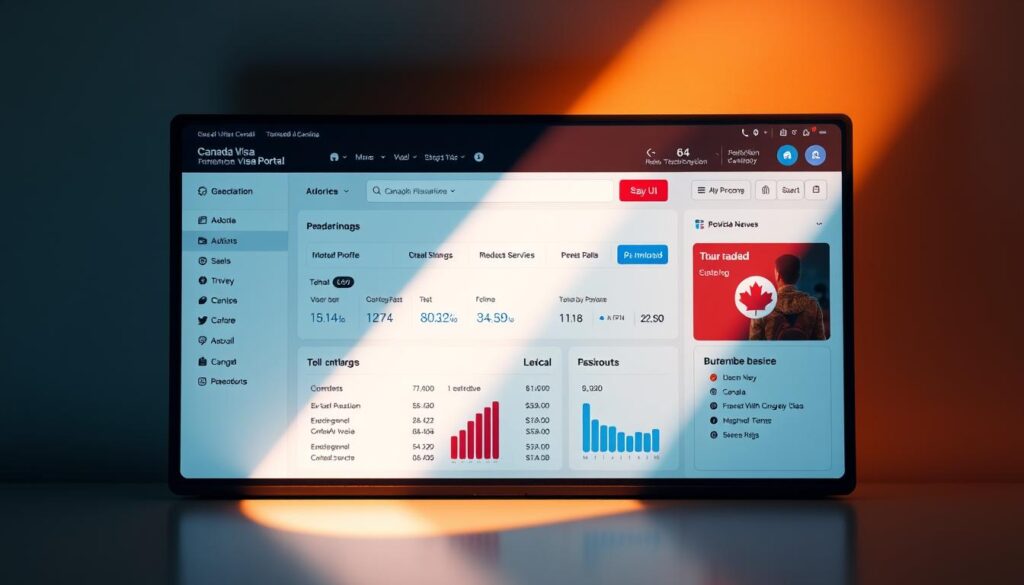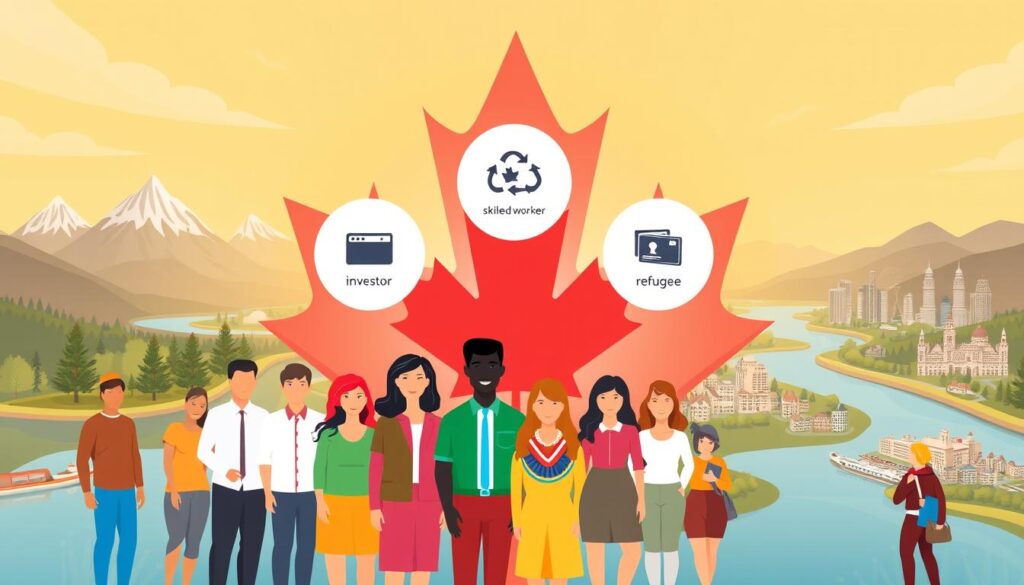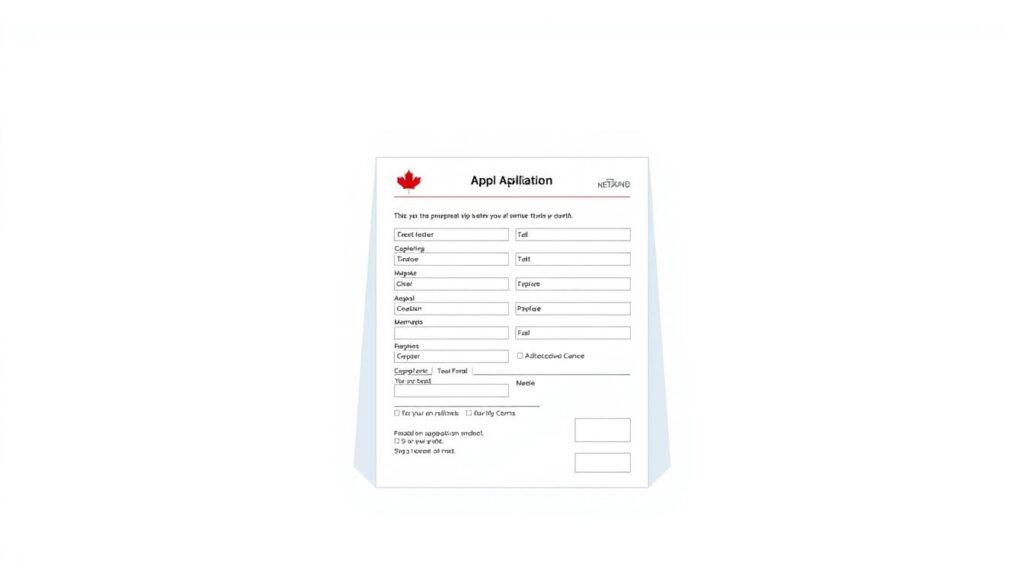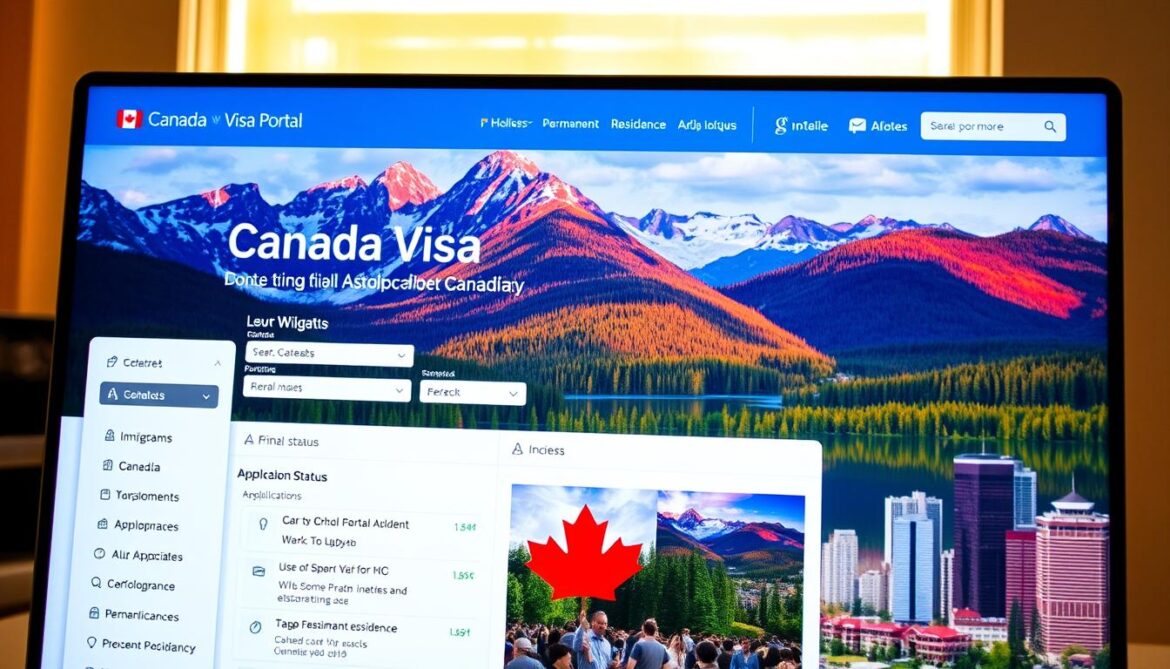Did you know over 400,000 people receive invitations to settle in Canada annually? The Canada Visa Portal, managed by IRCC, is the official platform to submit your request. This secure system simplifies the journey toward becoming a long-term resident.
Once invited, you have 60 days to complete your submission. Delays can risk your opportunity, so starting early is crucial. The portal guides you through four key steps: filling forms, uploading documents, paying fees, and final submission.
After entering basic details, the system generates a personalized checklist to ensure nothing is missed. This streamlined approach minimizes errors and speeds up processing. Ready to take the next step? Your path begins here.
How to Apply for Permanent Residence Canada: A Step-by-Step Guide
Navigating the process of settling in Canada starts with understanding the official portal. The IRCC’s secure platform streamlines submissions, but success depends on meeting strict criteria. Below, we break down the essentials.

Mastering the Visa Portal
Once logged in, the dashboard displays personalized checklists and application tools. Use the document upload feature to avoid delays. The system auto-saves progress, but always review entries before finalizing.
“Accuracy is critical—errors can delay processing by months.”
Who Qualifies for Long-Term Settlement?
Eligibility hinges on three pillars: language proficiency, work experience, and program fit. Below, a quick reference table outlines core requirements:
| Factor | Requirement | Proof Needed |
|---|---|---|
| Language | CLB 7 (IELTS/CELPIP) | Test results ≤2 years old |
| Work Experience | 1+ year skilled work | Employer letters, pay stubs |
| Education | ECA for foreign degrees | WES or ICAS report |
Express Entry candidates receive a CRS score based on these factors. Higher scores increase invitation chances. Provincial programs (PNPs) may prioritize local job offers or French fluency.
Medical exams are mandatory for all applicants and family members. Approved physicians must conduct these exams—book early to avoid bottlenecks.
Choosing the Right Immigration Program
Canada offers multiple pathways for skilled professionals and families seeking long-term opportunities. The right choice depends on your qualifications, work experience, and personal circumstances. Below, we break down the top options to help you decide.

Express Entry System
The Express Entry system prioritizes speed, with processing times averaging six months. Your Comprehensive Ranking System (CRS) score determines eligibility. Higher scores increase your chances of receiving an invitation.
Boost your CRS by improving language test results or gaining additional skilled work experience. Provincial nominations can add 600 points, significantly enhancing your profile.
Provincial Nominee Program (PNP)
PNPs cater to regional labor needs, often targeting specific professions like healthcare or tech. For example, Nova Scotia prioritizes nurses, while British Columbia seeks IT specialists.
Processing takes 12–18 months, but a provincial nomination fast-tracks your Express Entry application. Quebec operates separately, requiring French proficiency for its skilled worker program.
Family Sponsorship and Other Options
Sponsoring a relative requires meeting income thresholds (LICO) and proving financial stability. Business immigrants must show proof of funds, such as the $200,000 CAD investment for the Start-Up Visa.
Each immigration program has distinct advantages. Assess your goals and resources to pick the best fit.
Preparing Your Application
Proper preparation is key to a smooth immigration journey. Missing or incorrect paperwork can cause delays. Follow these steps to ensure your submission meets all requirements.

Gathering Required Documents
Start with this checklist of essential documents:
- Police clearance certificates (from every country you’ve lived in for 6+ months).
- Proof of funds (bank statements, investment records).
- Marriage, divorce, or birth certificates (if applicable).
Keep digital and physical copies organized. IRCC rejects incomplete submissions immediately.
Certifying and Translating Documents
Non-English or French files need translating by certified professionals. They must:
- Be members of a recognized translators’ association.
- Include an affidavit signed by a commissioner of oaths.
In Canada, notaries public or lawyers can certify copies. Abroad, use local authorities like embassies. *Never* ask family members—this voids your application.
“Unauthorized translations lead to 30% of rejections.”
Rules for certifying vary by province or territory. Check IRCC’s website for approved professionals near you.
Filling Out the Application Form
Attention to detail in your forms can make or break your immigration journey. The IRCC portal’s digital forms require precise information, with errors potentially delaying processing by months. Start by logging into your account and selecting Continue my profile to resume or begin your submission.

Step-by-Step Form Instructions
Mandatory fields include every address you’ve lived at for the past decade. Break this into clear timelines—gaps trigger review requests. For employment history, list roles chronologically with employer contacts. Inconsistent dates are a top rejection reason.
Travel documents must match passport stamps exactly. If you’ve had visa refusals, declare them upfront. Omitting this information risks a 5-year entry ban for misrepresentation. The family section requires all dependents, even if they aren’t accompanying you.
Common Mistakes to Avoid
Over 30% of applicants overlook these errors:
- Unclaimed dependent children (biological or adopted).
- Mismatched dates between forms and supporting documents.
- Using nicknames instead of legal names.
“Incomplete personal history sections account for 22% of returned applications.”
Review each page before saving. The system auto-checks for blanks but won’t catch logical inconsistencies. Bookmark IRCC’s form instructions guide for quick reference.
Uploading Your Documents
Uploading your documents correctly is a critical step in the immigration process. Errors here can delay approvals or trigger requests for resubmission. Follow these guidelines to ensure your files meet IRCC standards.

Document Checklist
Start by verifying you have all required files. Beyond basics like passports and proof of funds, you may need:
- Military service records (if applicable).
- Divorce decrees or custody agreements.
- Valid medical exam results from a panel physician (valid for 12 months).
Scanning and Formatting Tips
IRCC accepts PDF, JPEG, or PNG files under 4MB. For clarity:
- Scan at 300 DPI resolution in black-and-white.
- Combine multi-page documents (e.g., tax records) into single files.
- Name files logically (e.g., “Passport_JohnDoe.pdf”).
“Blurry scans or missing pages account for 15% of rejected submissions.”
Previous visa holders may be exempt from the biometrics fee. Check your account for pre-existing records. If unsure, consult IRCC’s exemption tool before paying.
Paying the Required Fees
Understanding the cost structure is essential before submitting your request. Fees vary by applicant type and are non-negotiable—paying the wrong amount risks delays. Below, we clarify the 2024 rates and payment options.
Understanding the Fee Structure
As of April 2024, the total processing fee for adults is $1,365 CAD. This includes:
- $850 CAD base processing fee.
- $515 CAD right of permanent residence fee (RPRF).
Dependent children cost $230 CAD each. Spouses or partners pay the same as principal applicants. Provincial nominees may have additional charges.
Payment Methods and Refunds
IRCC accepts:
- Credit/debit cards (processed instantly).
- Bank drafts (takes 14 days to clear).
“Currency conversion fees apply for international payments—check exchange rates beforehand.”
Partial refunds are possible if you withdraw before processing begins. Refused applications forfeit the RPRF but may recover the processing fee. Deferring the right of permanent residence fee is allowed until approval.
Submitting Your Application
Your journey reaches a critical phase when you submit your request. Accuracy here determines how quickly your case progresses. Follow these steps to ensure a seamless submission.
Final Review Before Submission
Double-check these essentials to avoid rejections:
- Signed IMM 0008 form with barcode pages attached.
- All supporting documents labeled correctly (e.g., “Passport_JaneDoe.pdf”).
- Payment confirmation for processing fees and biometrics (if required).
“Applications missing even one document are rejected without refunds.”
What to Expect After Submission
Your submission undergoes three stages:
- Completeness check: IRCC verifies all documents within 30 days.
- Background verification: Criminal and security screenings (3–6 months).
- Final decision: You’ll receive a Confirmation of Permanent Residence (COPR) if approved.
Track your status online using the application number provided. Paper applicants can link submissions to their portal accounts for updates.
| Program | Processing Time | Next Steps |
|---|---|---|
| Express Entry | 6 months | Passport request for visa stamping |
| PNP | 16 months | Provincial nomination confirmation |
Post-approval, you’ll submit your passport and receive your COPR. Plan to arrive in Canada before your medical exam or police certificates expire.
Tips for a Successful Application
Maximizing your chances of approval requires strategic planning. Small oversights can lead to delays or rejections. Below, we outline expert-recommended strategies to streamline your journey.
Common Pitfalls and How to Avoid Them
Outdated documents top the rejection list. Update police certificates and medical exams if they expire during processing. Life changes like marriage or a new job must be reported immediately.
Uncertified translations void 30% of submissions. Use accredited professionals for non-English/French files. They must include an affidavit and translator credentials.
“Missing dependent children—even non-accompanying ones—is the #1 reason for family sponsorship refusals.”
Resources for Additional Help
IRCC’s online processing time tool updates weekly. Check it to manage expectations. If delays exceed norms, order GCMS notes for detailed status updates.
Jane Katkova & Associates offers consultation services ($250 CAD/hour) for complex cases. Licensed consultants (RCIC) verify eligibility and refine applications.
| Approved Language Test Centers | Validity Period | Processing Time |
|---|---|---|
| IELTS/CELPIP (English) | 2 years | 3–5 business days |
| TEF Canada (French) | 2 years | 7–10 business days |
Authorized representatives simplify immigration processes. Always verify their RCIC number on the College of Immigration Consultants website.
Conclusion
Securing your future in Canada starts with careful planning and execution. Permanent residency unlocks vital benefits like healthcare access and a clear path to citizenship. Use the portal’s auto-save feature to safeguard your progress.
While waiting for approval, maintain valid temporary status. Before submitting, apply permanent diligence to these final checks:
- All fees processed
- Documents certified and translated
- Forms signed with barcodes attached
Monitor your case through IRCC’s status tracker. With everything in order, you’re steps away from beginning your new chapter.
FAQ
What is the Express Entry system?
How do I check my eligibility for permanent residency?
What documents are required for the application?
How much does it cost to apply?
FAQ
What is the Express Entry system?
The Express Entry system is Canada’s fastest way to get a visa. It ranks candidates based on skills, work experience, and language test results. High-ranking profiles receive an Invitation to Apply (ITA) for permanent residency.
How do I check my eligibility for permanent residency?
Use the online eligibility tool on the Canada Visa Portal. You’ll need details like your work history, language test scores, and education credentials. Meeting the minimum points requirement is key.
What documents are required for the application?
You’ll need a valid passport, language test results, proof of work experience, and education certificates. Some programs may require additional documents like a provincial nomination or proof of funds.
How much does it cost to apply?
Fees vary by program. The main processing fee is
FAQ
What is the Express Entry system?
The Express Entry system is Canada’s fastest way to get a visa. It ranks candidates based on skills, work experience, and language test results. High-ranking profiles receive an Invitation to Apply (ITA) for permanent residency.
How do I check my eligibility for permanent residency?
Use the online eligibility tool on the Canada Visa Portal. You’ll need details like your work history, language test scores, and education credentials. Meeting the minimum points requirement is key.
What documents are required for the application?
You’ll need a valid passport, language test results, proof of work experience, and education certificates. Some programs may require additional documents like a provincial nomination or proof of funds.
How much does it cost to apply?
Fees vary by program. The main processing fee is $1,365 CAD for adults, plus additional costs like biometrics. Check the official website for the latest fee structure before submitting.
Can I include my family in the application?
Yes, you can include your spouse, common-law partner, and dependent children. Each family member must meet medical and security requirements. Additional fees apply for dependents.
How long does processing take?
Processing times depend on the program. Express Entry applications usually take six months, while other programs may take longer. Delays can happen if documents are missing or incomplete.
What happens after I submit my application?
You’ll receive an acknowledgment of receipt (AOR). Immigration officers may request additional documents. Once approved, you’ll get a Confirmation of Permanent Residence (COPR) and can complete the landing process.
Can I work while my application is being processed?
If you’re already in Canada on a valid work permit, you can continue working. If you’re outside Canada, you’ll need a separate work visa to start employment before approval.
What if my application is refused?
You’ll receive a refusal letter explaining the reason. You may appeal, reapply with stronger documents, or explore other immigration programs. Consulting an immigration lawyer can help.
,365 CAD for adults, plus additional costs like biometrics. Check the official website for the latest fee structure before submitting.
Can I include my family in the application?
Yes, you can include your spouse, common-law partner, and dependent children. Each family member must meet medical and security requirements. Additional fees apply for dependents.
How long does processing take?
Processing times depend on the program. Express Entry applications usually take six months, while other programs may take longer. Delays can happen if documents are missing or incomplete.
What happens after I submit my application?
You’ll receive an acknowledgment of receipt (AOR). Immigration officers may request additional documents. Once approved, you’ll get a Confirmation of Permanent Residence (COPR) and can complete the landing process.
Can I work while my application is being processed?
If you’re already in Canada on a valid work permit, you can continue working. If you’re outside Canada, you’ll need a separate work visa to start employment before approval.
What if my application is refused?
You’ll receive a refusal letter explaining the reason. You may appeal, reapply with stronger documents, or explore other immigration programs. Consulting an immigration lawyer can help.



